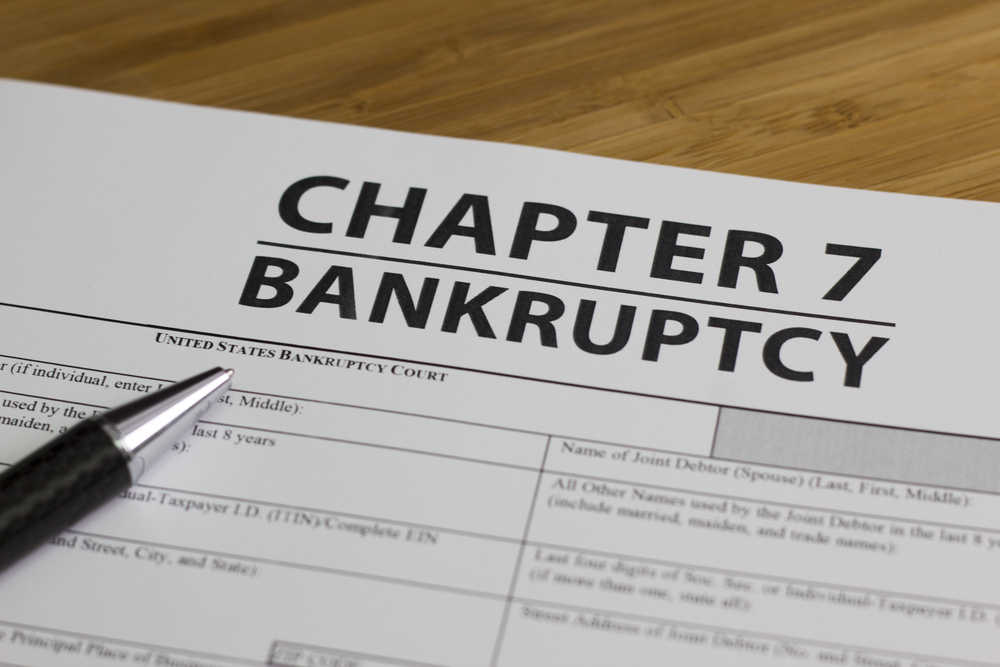How Often Are Chapter 7 Bankruptcies Denied
How Often Are Chapter 7 Bankruptcies Denied - Liquidation under chapter 7 is a common form of bankruptcy. Web a chapter 7 bankruptcy is never denied, as in, the court says “you can’t file this and now you must be in a chapter 13.”. It is available to individuals who cannot make regular, monthly, payments toward their debts. Finally, if you expect your financial situation to get worse, then you may want to delay your filing. Web if the debtor fails to follow the rules or doesn't provide mandatory information, a creditor, the bankruptcy trustee, or the u.s. This type of bankruptcy, also. You can only file chapter 7 bankruptcy. When you file bankruptcy, you state under oath. Courts website, when chapter 7 cases are correctly filed, they result in a successful discharge of debts more than 99 percent of the time. You'll include information about your assets and debts, income and expenses, and previous financial transactions (you'll find a chapter 7 bankruptcy.
Bankruptcy law, individuals can file for chapter 7 bankruptcy every eight years from the date of the discharge of their previous chapter 7 bankruptcy. It is possible that someone could file a chapter 7 and the court could determine that person should. In some situations, there may be no waiting period. Web if you make false statements in connection with your bankruptcy or conceal information regarding your financial condition, your chapter 7 bankruptcy could be denied. This runs from the date you filed the first case to the date you filed the second case. The time you have to wait between filing a chapter 7. But you won't need to wait that long if you filed a different chapter before, such as chapter 13, or if you plan to file another chapter in the future. Web you can only get one chapter 7 bankruptcy discharge every eight years. This type of bankruptcy, also. Web the same generally goes for car loans, if you want to keep the car.
When you file bankruptcy, you state under oath. Web if the debtor fails to follow the rules or doesn't provide mandatory information, a creditor, the bankruptcy trustee, or the u.s. It is possible that someone could file a chapter 7 and the court could determine that person should. Finally, if you expect your financial situation to get worse, then you may want to delay your filing. Web a chapter 7 case will stay on your credit report for up to 10 years from the bankruptcy file date, whereas a chapter 13 case will be erased seven years after filing. The time you have to wait between filing a chapter 7. Web if you make false statements in connection with your bankruptcy or conceal information regarding your financial condition, your chapter 7 bankruptcy could be denied. Trustee can object to the entire chapter 7 discharge. In some situations, there may be no waiting period. Web the same generally goes for car loans, if you want to keep the car.
A Chapter 7 bankruptcy typically takes around six months to complete
For instance, the court can deny a chapter 7. Web you can receive a chapter 7 bankruptcy discharge every eight years. Web you can only get one chapter 7 bankruptcy discharge every eight years. The time you have to wait between filing a chapter 7. Web the waiting period to file another bankruptcy case generally ranges from two to eight.
Customers with bankruptcies need reliable transportation, too Exeter
Web you can receive a chapter 7 bankruptcy discharge every eight years. Web the same generally goes for car loans, if you want to keep the car. Finally, if you expect your financial situation to get worse, then you may want to delay your filing. Web while some chapter 7 bankruptcy cases are kicked out of court before discharge, statistics.
Business Bankruptcies Finally Dropping
In both cases, the bankruptcy will. This type of bankruptcy, also. Here's what you need to know: Web eligibility for chapter 7 bankruptcy. It is possible that someone could file a chapter 7 and the court could determine that person should.
Personal Chapter 7 Bankruptcy versus Personal Chapter 13 Bankruptcy
Businesses choosing to terminate their enterprises may also file chapter 7. This runs from the date you filed the first case to the date you filed the second case. Web if you make false statements in connection with your bankruptcy or conceal information regarding your financial condition, your chapter 7 bankruptcy could be denied. Web a chapter 7 bankruptcy is.
Everything You Need to Know About Chapter 7 Bankruptcy Loan Lawyers
This runs from the date you filed the first case to the date you filed the second case. Web while some chapter 7 bankruptcy cases are kicked out of court before discharge, statistics indicate that this isn't the norm. Bankruptcy law, individuals can file for chapter 7 bankruptcy every eight years from the date of the discharge of their previous.
Different Types of Bankruptcies Chapter 7, 13, 11, 12 and 9
Web eligibility for chapter 7 bankruptcy. Web a chapter 7 case will stay on your credit report for up to 10 years from the bankruptcy file date, whereas a chapter 13 case will be erased seven years after filing. Probably the most common reason that people cannot file for chapter 7 is their inability to pass the bankruptcy. When you.
How Bankruptcies Work?
We've helped 205 clients find attorneys today. Web a chapter 7 bankruptcy is never denied, as in, the court says “you can’t file this and now you must be in a chapter 13.”. Web the waiting period to file another bankruptcy case generally ranges from two to eight years, depending on the type of bankruptcy. Web eligibility for chapter 7.
Chapter 7 Ins & Out of Bankruptcy Filing
In both cases, the bankruptcy will. Bankruptcy law, individuals can file for chapter 7 bankruptcy every eight years from the date of the discharge of their previous chapter 7 bankruptcy. Your waiting period depends on the chapter filed previously and the chapter. Web eligibility for chapter 7 bankruptcy. Web if you've ever filed for bankruptcy in the past, you may.
How often is Chapter 7 bankruptcy denied? YouTube
This runs from the date you filed the first case to the date you filed the second case. Courts website, when chapter 7 cases are correctly filed, they result in a successful discharge of debts more than 99 percent of the time. Web the same generally goes for car loans, if you want to keep the car. Trustee can object.
How often are chapter 7 bankruptcies denied?
Businesses choosing to terminate their enterprises may also file chapter 7. We've helped 205 clients find attorneys today. But you won't need to wait that long if you filed a different chapter before, such as chapter 13, or if you plan to file another chapter in the future. Bankruptcy law, individuals can file for chapter 7 bankruptcy every eight years.
Web Eligibility For Chapter 7 Bankruptcy.
Web you can only get one chapter 7 bankruptcy discharge every eight years. Web you can receive a chapter 7 bankruptcy discharge every eight years. Web while some chapter 7 bankruptcy cases are kicked out of court before discharge, statistics indicate that this isn't the norm. Trustee can object to the entire chapter 7 discharge.
Liquidation Under Chapter 7 Is A Common Form Of Bankruptcy.
But you won't need to wait that long if you filed a different chapter before, such as chapter 13, or if you plan to file another chapter in the future. Web the waiting period to file another bankruptcy case generally ranges from two to eight years, depending on the type of bankruptcy. Web a chapter 7 bankruptcy will stay on your credit report for 10 years, while a chapter 13 bankruptcy will fall off after seven years. Courts website, when chapter 7 cases are correctly filed, they result in a successful discharge of debts more than 99 percent of the time.
You Can Only File Chapter 7 Bankruptcy.
It is possible that someone could file a chapter 7 and the court could determine that person should. Web if you make false statements in connection with your bankruptcy or conceal information regarding your financial condition, your chapter 7 bankruptcy could be denied. When you file bankruptcy, you state under oath. You'll include information about your assets and debts, income and expenses, and previous financial transactions (you'll find a chapter 7 bankruptcy.
Web If The Debtor Fails To Follow The Rules Or Doesn't Provide Mandatory Information, A Creditor, The Bankruptcy Trustee, Or The U.s.
In some situations, there may be no waiting period. This runs from the date you filed the first case to the date you filed the second case. Web if you've ever filed for bankruptcy in the past, you may be wondering how often can you file for chapter 7 bankruptcy? Here's what you need to know:









